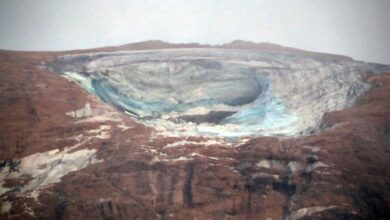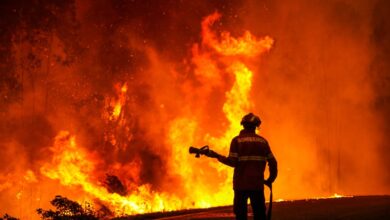Climate crisis threatens new pandemics by increasing risk of virus ‘spillover’ from animals

Climate change threatens to cause another pandemic by “dramatically increasing” risk of viruses jumping from animals to humans, a study has warned.
Wild animals relocating to new habitats in search of food are likely to spread viruses among each other and onto people, scientists said.
Researchers at Georgetown University Medical Center (GUMC) predicted animals will increasingly move to more urban areas in search of food.
This, they added, will increase the chances of viral transmission between animals, risking outbreaks of disease, such as the ongoing Covid pandemic.
The source of the ongoing pandemic is not definitively known but it is believed an infected bat may have passed the disease to the first human victim in Wuhan, China.
The mixing of unhealthy animals and humans at food markets has been linked to spreading disease.
Colin Carlson, assistant research professor at the Center for Global Health Science and Security at GUMC, Washington, US, likened the climate risk to that seen in food markets.
“The closest analogy is actually the risks we see in the wildlife trade,” he said.
“We worry about markets because bringing unhealthy animals together in unnatural combinations creates opportunities for this stepwise process of emergence – like how Sars jumped from bats to civets, then civets to people.
“But markets aren’t special anymore; in a changing climate, that kind of process will be the reality in nature just about everywhere.”
For their peer-reviewed study, published in the Nature journal on 28 April, the researchers said they conducted the first comprehensive assessment of how climate change will restructure the global mammalian virome.
Their work focused on geographic range shifts and the journeys that species will undertake as they follow their habitats into new areas.
As they encounter other mammals for the first time, the study projects they will share thousands of viruses.
They say these shifts bring greater opportunities for viruses like Ebola or coronaviruses to emerge in new areas, making them harder to track, and into new types of animals, making it easier for viruses to jump across a “stepping stone” species into humans.
The researchers said animal habitats will move disproportionately in the same places as human settlements, creating new hotspots of spillover risk.
Much of this process may already be underway in today’s 1.2C warmer world, and efforts to reduce greenhouse gas emissions may not stop these events from unfolding, they added.
An additional finding, the researchers said, was the impact rising temperatures could have on bats, which account for the majority of novel viral sharing.
Their ability to fly will allow them to travel long distances, and share the most viruses.
Because of their central role in viral emergence, the greatest impacts are projected in southeast Asia, a global hotspot of bat diversity.





